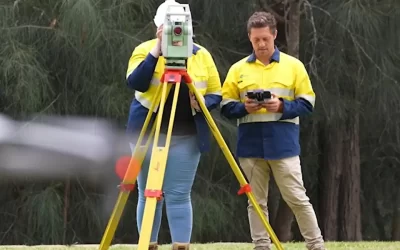In the realm of construction and development, land surveyors in Sydney play a pivotal role in ensuring that projects are executed smoothly and efficiently. Their expertise not only helps in defining boundaries and topographical features but also in managing the complexities associated with large-scale projects. They assess subsurface materials to evaluate potential hazards and inform design recommendations. This article delves into the various ways land surveyors manage big projects, highlighting their methodologies, tools, and the critical skills they employ. Subsurface exploration is crucial in geotechnical investigations to identify soil, rock, and groundwater conditions.
Introduction to Project Management
Project management is a crucial aspect of construction projects, involving the planning, execution, and monitoring of projects to ensure they are completed on time, within budget, and to the required quality standards. Effective project management involves identifying and assessing risks, developing strategies to mitigate them, and ensuring compliance with regulatory requirements and industry standards.
Construction projects require a deep understanding of soil and rock properties, as well as the ability to conduct geotechnical investigations to determine the engineering properties of subsurface materials. These investigations are vital for assessing soil conditions, groundwater levels, and potential contamination, which can significantly impact the project’s success.
Non-destructive digging (NDD) methods, such as hydro excavation, are increasingly being used in construction projects to minimise the risk of damage to underground services and ensure a safe working environment. These methods provide an efficient alternative to traditional destructive digging techniques, reducing the risk of damaging buried services and improving overall site safety.
Effective project management is vital to the success of construction projects, and requires a deep understanding of the technical, environmental, and regulatory aspects of construction. By leveraging their extensive experience and knowledge, project managers can ensure that projects are completed on time, within budget, and to the highest quality standards, ultimately contributing to the overall success and sustainability of the built environment.
The Role of Land Surveyors in Project Management
Land surveyors are integral to the project management process, serving as the bridge between initial planning and final execution. They assess subsurface materials to evaluate engineering properties and potential hazards. Their work begins long before construction starts, laying the groundwork for successful project delivery. Subsurface exploration is crucial in geotechnical investigations to identify soil, rock, and groundwater conditions.
Test pits are a method for examining the upper layers of the subsurface, providing valuable data. Non-destructive digging methods allow for careful excavation of the ground surface without damaging underground utilities. The procurement process generally includes standardised steps to ensure efficiency and compliance.
Effective procurement practices play a critical role in managing expense, leading to significant cost savings. Geotechnical investigation is essential in construction projects to ensure safety and stability. Vacuum technology in non-destructive digging enhances safety and efficiency.
Collecting sample soil and rock is vital for understanding subsurface conditions. Procurement directly impacts business growth by optimising cost and quality. For more information, clients can visit the website.
Procurement also affects production costs by sourcing sustainable materials. Understanding soils is crucial in geotechnical investigations to determine stability. Pricing is a key factor in procurement processes, influencing supplier selection and cost control.
Core values in procurement practices align with strategic business objectives. Establishing good supplier relationships leads to better performance and collaboration. Geotechnical investigations assess structure suitability for construction projects.
Sampling is a critical part of subsurface exploration to analyse soil properties. Various methods, such as borehole drilling and in-situ testing, are used in geotechnical investigations. Obtaining samples during investigations is essential for accurate analysis.
Hydro excavation is effective in handling challenging soil conditions, such as clay, without disturbing the surrounding area.
Initial Site Assessment
The first step in any major project is a comprehensive site assessment to evaluate and assess subsurface materials. Land surveyors utilise advanced technology to gather data about the land’s topography, existing structures, and natural features. Subsurface exploration is crucial in geotechnical investigations to identify soil, rock, and groundwater conditions.
Using tools like GPS and GIS (Geographic Information Systems), surveyors can create detailed maps and models that inform project planning. Test pits are a method used to examine the upper layers of the subsurface. These assessments not only help in determining the feasibility of a project but also in identifying any regulatory constraints that may impact development.
Non-destructive digging methods allow for careful excavation of the ground surface without damaging underground utilities. The procurement process generally includes standardised steps to ensure efficiency and compliance. Effective procurement plays a critical role in managing expense and optimizing budget considerations.
Geotechnical investigation is significant in construction projects for ensuring safety and stability. Vacuum technology in non-destructive digging enhances safety and efficiency. Collecting sample soil and rock is essential for understanding subsurface conditions.
Procurement is crucial for business growth, impacting cost savings and operational efficiency. The website serves as a resource for more information about services and solutions. Effective procurement practices can lower production costs and improve service quality.
Understanding soils is vital in geotechnical investigations to ensure safe construction. Pricing is a critical aspect of procurement processes, influencing supplier selection and cost management. Core values in procurement practices align with strategic business objectives.
Establishing good supplier relationships can lead to improved performance and collaboration. Geotechnical investigations assess the suitability of structures by examining soil and rock properties. Sampling is a key part of subsurface exploration to gather data for analysis.
Understanding both surface and subsurface conditions is crucial in geotechnical investigations. Knowing the physical properties of soil and rock informs safe construction practices. Hydro excavation is effective in handling challenging soil conditions, such as clay, without disturbing the surrounding area.
Boundary Identification and Legal Considerations
Establishing clear boundaries is essential in any construction project to assess subsurface materials and avoid disputes and ensure compliance with local regulations. Land surveyors in Sydney are responsible for accurately marking property lines and ensuring that all stakeholders are aware of these boundaries. Subsurface exploration is crucial in geotechnical investigations to identify soil, rock, and groundwater conditions.
This aspect of their work often involves liaising with legal professionals to ensure that all documentation is in order. Test pits are a method used to examine the upper layers of the subsurface. By providing precise measurements and legal descriptions, surveyors help to mitigate risks associated with boundary disputes, which can lead to costly delays and legal complications. Non-destructive digging methods allow for careful excavation of the ground surface without damaging underground utilities. The procurement process generally includes standardised steps to ensure efficiency and compliance.
Effective procurement practices play a significant role in managing expense and ensuring cost control. Geotechnical investigation is critical in construction projects to determine subsurface conditions and potential hazards. Vacuum technology in non-destructive digging enhances safety and efficiency. Collecting sample soil and rock is essential for understanding subsurface conditions.
Procurement is crucial for business growth, impacting cost savings and operational efficiency. For more information, clients can visit the website. Effective procurement also influences production costs, improving service quality. Understanding soils is vital in geotechnical investigations to ensure construction safety.
Pricing is a critical aspect of procurement processes, affecting supplier selection and cost forecasting. Core values in procurement practices align with a company’s strategic objectives. Establishing good supplier relationships can lead to improved performance and better contract terms. Geotechnical investigations assess the suitability of structures by examining soil and rock properties.
Sampling is a key part of subsurface exploration, providing data for analysis. Various methods, such as borehole drilling and in-situ testing, are used in geotechnical investigations. Obtaining samples during investigations is crucial for accurate analysis. High pressure water is used in non-destructive digging to safely excavate around utilities.
Transport plays a critical role in procurement, affecting supply chain emissions and resiliency. Understanding both surface and subsurface conditions is important in geotechnical investigations. Knowing the physical properties of soil and rock is essential for safe construction. Hydro excavation is effective in handling challenging soil conditions, such as clay.
Project Planning and Coordination
Once the initial assessments are complete, land surveyors transition into the planning phase, where their role becomes even more critical. Effective project management and site surveying requires meticulous organisation and coordination among various stakeholders.
Collaboration with Engineers and Architects
Land surveyors work closely with engineers and architects to ensure that the design of the project aligns with the physical characteristics of the site. This collaboration is vital in creating a cohesive plan that addresses both aesthetic and functional considerations.
By providing accurate data and insights, surveyors help to inform design decisions, ensuring that structures are not only visually appealing but also structurally sound. This collaborative approach minimises the risk of costly redesigns and delays during construction.
Scheduling and Resource Allocation
Effective project management is heavily reliant on proper scheduling and resource allocation. Land surveyors play a key role in developing timelines that account for the various phases of a project, from initial surveying to final inspections.
They also assist in identifying the resources required at each stage, ensuring that equipment and personnel are available when needed. This foresight helps to prevent bottlenecks and keeps the project on track, ultimately leading to timely completion.
Utilising Technology in Project Management
In today’s fast-paced world, technology has transformed the way land surveyors manage projects. The integration of modern tools not only enhances efficiency but also improves accuracy and communication.
Advanced Surveying Equipment
Land surveyors now employ a range of advanced equipment, such as drones, 3D laser scanners, and total stations, to collect data with remarkable precision. Drones, for instance, can cover large areas quickly, providing high-resolution aerial imagery that aids in site analysis and planning.
3D laser scanning technology allows surveyors to create detailed three-dimensional models of the terrain, capturing intricate details that traditional methods may overlook. This level of accuracy is invaluable in ensuring that all project specifications are met.
Project Management Software
In addition to advanced surveying tools, project management software has become an essential resource for land surveyors. These platforms facilitate real-time collaboration among team members, enabling seamless communication and information sharing.
With features such as task management, document sharing, and progress tracking, project management software helps surveyors stay organised and focused. This technology not only streamlines workflows but also enhances accountability, as all team members can easily access updates and changes.
Quality Assurance and Compliance
Ensuring quality and compliance is a fundamental aspect of project management that land surveyors take very seriously. Their expertise in regulations and standards helps to safeguard the integrity of the project.
Conducting Regular Inspections
Throughout the construction process, land surveyors conduct regular inspections to verify that work is being carried out according to the approved plans and specifications. These inspections help to identify any discrepancies early on, allowing for timely corrections that can prevent more significant issues down the line.
By maintaining a proactive approach to quality assurance, surveyors help to uphold the safety and reliability of the structures being built. This commitment to quality not only protects the investment but also enhances the reputation of the project team.
Adhering to Regulatory Standards
Land surveyors must stay abreast of local and national regulations that govern construction and land use. Their understanding of these legal frameworks is crucial in ensuring that projects comply with all necessary standards.
This compliance extends beyond initial approvals; it includes ongoing assessments throughout the project lifecycle. By ensuring adherence to regulations, land surveyors help to mitigate risks associated with non-compliance, which can lead to fines, delays, or even project cancellation.
Risk Management Strategies
In any large-scale project, risks are inevitable. Land surveyors are trained to identify potential risks early and develop strategies to mitigate them, ensuring that projects remain on schedule and within budget.
Identifying Potential Risks
Risk identification begins during the initial site assessment when surveyors evaluate factors such as environmental conditions, geological stability, and existing infrastructure. Understanding these elements allows surveyors to foresee challenges that may arise during construction.
By conducting thorough analyses, Sydney surveying companies can provide recommendations to address these risks, whether through design modifications or additional safety measures. This proactive approach is essential in minimising disruptions and maintaining project momentum.
Developing Contingency Plans
In addition to identifying risks, land surveyors are instrumental in developing contingency plans. These plans outline alternative strategies to be implemented should unforeseen circumstances arise, such as adverse weather conditions or unexpected site conditions.
Having a well-defined contingency plan in place ensures that the project can adapt to changes without significant delays. This flexibility is a hallmark of effective project management and is vital for maintaining stakeholder confidence.
The Importance of Communication
Effective communication is the backbone of successful project management. Land surveyors must maintain open lines of communication with all stakeholders, including clients, contractors, and regulatory authorities.
Regular Updates and Reporting
Land surveyors provide regular updates to clients and project managers, ensuring that everyone is informed about progress, challenges, and any changes to the project plan. This transparency fosters trust and collaboration among all parties involved.
Reporting also plays a critical role in documentation, as it creates a record of decisions made and actions taken throughout the project. This documentation can be invaluable for future reference or in the event of disputes.
Facilitating Stakeholder Engagement
Engaging stakeholders is another key aspect of communication. Land surveyors often act as mediators, facilitating discussions between different parties to ensure that everyone’s interests are considered and addressed.
This engagement not only helps to build consensus but also enhances the overall project outcome. By fostering a collaborative environment, land surveyors contribute to a more efficient and harmonious project delivery process.
Conclusion
In conclusion, land surveyors are essential to the successful management of large-scale projects. Their expertise in site assessment, project planning, technology utilisation, quality assurance, risk management, and communication ensures that projects are executed efficiently and effectively. As the construction industry continues to evolve, the role of land surveyors will remain critical in navigating the complexities of modern project management services.
By leveraging their skills and knowledge, land surveyors not only contribute to the successful completion of projects but also enhance the overall quality and sustainability of the built environment. Their commitment to excellence and collaboration makes them invaluable partners in any major construction endeavour.




